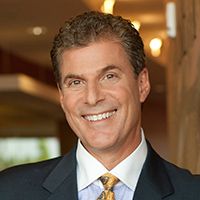Learn From a $700,000 Mistake: Taking Undue Risk is Avoidable
Investors can’t avoid stock market volatility, but they can protect themselves with some good advice.


Profit and prosper with the best of Kiplinger's advice on investing, taxes, retirement, personal finance and much more. Delivered daily. Enter your email in the box and click Sign Me Up.
You are now subscribed
Your newsletter sign-up was successful
Want to add more newsletters?

Delivered daily
Kiplinger Today
Profit and prosper with the best of Kiplinger's advice on investing, taxes, retirement, personal finance and much more delivered daily. Smart money moves start here.

Sent five days a week
Kiplinger A Step Ahead
Get practical help to make better financial decisions in your everyday life, from spending to savings on top deals.

Delivered daily
Kiplinger Closing Bell
Get today's biggest financial and investing headlines delivered to your inbox every day the U.S. stock market is open.

Sent twice a week
Kiplinger Adviser Intel
Financial pros across the country share best practices and fresh tactics to preserve and grow your wealth.

Delivered weekly
Kiplinger Tax Tips
Trim your federal and state tax bills with practical tax-planning and tax-cutting strategies.

Sent twice a week
Kiplinger Retirement Tips
Your twice-a-week guide to planning and enjoying a financially secure and richly rewarding retirement

Sent bimonthly.
Kiplinger Adviser Angle
Insights for advisers, wealth managers and other financial professionals.

Sent twice a week
Kiplinger Investing Weekly
Your twice-a-week roundup of promising stocks, funds, companies and industries you should consider, ones you should avoid, and why.

Sent weekly for six weeks
Kiplinger Invest for Retirement
Your step-by-step six-part series on how to invest for retirement, from devising a successful strategy to exactly which investments to choose.
At one time or another, all of us depend on the advice of others to help us navigate our way through unfamiliar territory.
Sometimes the advice is stellar. I once was on a fairway at the famous Pebble Beach Golf Club in California and facing a particularly difficult hole. One miscue and my ball would land unceremoniously in the Pacific Ocean. A caddy, savvy to the nuances of the course, suggested which club I should use. I followed the advice and not only saved the ball, but made it to the green and finished on par.
On other occasions, though, advice can be flawed.
From just $107.88 $24.99 for Kiplinger Personal Finance
Become a smarter, better informed investor. Subscribe from just $107.88 $24.99, plus get up to 4 Special Issues

Sign up for Kiplinger’s Free Newsletters
Profit and prosper with the best of expert advice on investing, taxes, retirement, personal finance and more - straight to your e-mail.
Profit and prosper with the best of expert advice - straight to your e-mail.
In 1998, my wife and I were building our insurance business in the Mid-Atlantic. A friend suggested I meet his investment broker, who could get me in on the ground floor with new private companies just as they were seeking capital to expand and launch their IPOs (initial public offerings).
The broker said I should invest in tech stocks, which at the time had a high growth potential. She also warned me that I could lose some money, but the potential loss didn’t compare with how much I could make. In the course of two years, my investment of $250,000 grew to $763,000. As you might imagine, I couldn’t have been more pleased.
For a while, at least.
In 2000, while on a Caribbean cruise, I happened to catch the news and didn’t like what I saw happening with the stock market. The market was falling harder and harder each day, and I couldn’t call my broker to find out what was going on with my investments until I returned to the United States.
I was devastated to learn I had lost more than $300,000 of that $763,000. But I continued to ride it out, hoping that if I waited, my investment would bounce back. Unfortunately, the market didn’t reverse course, and my investment eroded to $63,000.
All I wanted to do was grow my money, but working with a stockbroker and being exposed to so much risk had lost its appeal. I finally cashed out, but not without the drive to do something about it. I knew there had to be others who had met a similar fate.
That’s when I decided to make a career course change, become a Certified Financial Planner™ and build a practice that could help people invest for the long term by using a variety of financial strategies that include both insurance and investment products. I think it’s important for anyone to work with a financial professional who can develop strategies to help them protect their hard-earned money rather than taking risks they can’t afford and don’t need to take.
You’ve probably heard that it’s essential to have a diversified portfolio. But perhaps even more important, you want to have an overall plan in place — and make sure that plan is a sound one. Sometimes clients have come to me with what they thought was a well-laid plan — until I pointed out they are taking much more risk than they need to take.
In life, we tend to learn from mistakes. Of course, it’s even better when we can learn from someone else’s mistakes rather than our own. As painful as it is, I tell people to feel free to learn from the mistake I made of taking undue risk. That’s especially true when you’re counting on your investments to fund your retirement, because when your retirement is on the line, you’ve got to do it right. It’s critical that you have a retirement plan in place that will help you make sure your money lasts as long as you do.
As was the case with that hole at Pebble Beach, you want advice that will keep you on par and as far away as possible from those hazards.
Alfie Tounjian is a CERTIFIED FINANCIAL PLANNER™ and founder and president of Advantage Retirement Group and Tounjian Advisory Group LLC. Alfie is an Investment Adviser Representative of Tounjian Advisory Group and a licensed insurance professional.
Rozel Swain contributed to this article.
Investing involves risk, including the potential loss of principal. No investment strategy can guarantee a profit or protect against loss in periods of declining values. Any references to protection benefits or lifetime income generally refer to fixed insurance products, never securities or investment products. Insurance and annuity product guarantees are backed by the financial strength and claims-paying ability of the issuing insurance company.
Profit and prosper with the best of Kiplinger's advice on investing, taxes, retirement, personal finance and much more. Delivered daily. Enter your email in the box and click Sign Me Up.

Alfie Tounjian is a Certified Financial Planner™, an Investment Adviser Representative and founder and president of Advantage Retirement Group and Tounjian Advisory Group LLC. He is also a licensed insurance professional. He has been in the financial services industry for more than 30 years. His practice focuses on wealth accumulation, asset protection, retirement income strategies, IRA and 401(k) rollovers, life insurance and annuities. Tounjian shares his financial philosophy weekly on his "Saving the Investor" television and radio shows. He resides in Fort Myers, Florida, with his wife, Tommie, and their son.
-
 Quiz: Do You Know How to Avoid the "Medigap Trap?"
Quiz: Do You Know How to Avoid the "Medigap Trap?"Quiz Test your basic knowledge of the "Medigap Trap" in our quick quiz.
-
 5 Top Tax-Efficient Mutual Funds for Smarter Investing
5 Top Tax-Efficient Mutual Funds for Smarter InvestingMutual funds are many things, but "tax-friendly" usually isn't one of them. These are the exceptions.
-
 AI Sparks Existential Crisis for Software Stocks
AI Sparks Existential Crisis for Software StocksThe Kiplinger Letter Fears that SaaS subscription software could be rendered obsolete by artificial intelligence make investors jittery.
-
 Social Security Break-Even Math Is Helpful, But Don't Let It Dictate When You'll File
Social Security Break-Even Math Is Helpful, But Don't Let It Dictate When You'll FileYour Social Security break-even age tells you how long you'd need to live for delaying to pay off, but shouldn't be the sole basis for deciding when to claim.
-
 I'm an Opportunity Zone Pro: This Is How to Deliver Roth-Like Tax-Free Growth (Without Contribution Limits)
I'm an Opportunity Zone Pro: This Is How to Deliver Roth-Like Tax-Free Growth (Without Contribution Limits)Investors who combine Roth IRAs, the gold standard of tax-free savings, with qualified opportunity funds could enjoy decades of tax-free growth.
-
 One of the Most Powerful Wealth-Building Moves a Woman Can Make: A Midcareer Pivot
One of the Most Powerful Wealth-Building Moves a Woman Can Make: A Midcareer PivotIf it feels like you can't sustain what you're doing for the next 20 years, it's time for an honest look at what's draining you and what energizes you.
-
 I'm a Wealth Adviser Obsessed With Mahjong: Here Are 8 Ways It Can Teach Us How to Manage Our Money
I'm a Wealth Adviser Obsessed With Mahjong: Here Are 8 Ways It Can Teach Us How to Manage Our MoneyThis increasingly popular Chinese game can teach us not only how to help manage our money but also how important it is to connect with other people.
-
 Looking for a Financial Book That Won't Put Your Young Adult to Sleep? This One Makes 'Cents'
Looking for a Financial Book That Won't Put Your Young Adult to Sleep? This One Makes 'Cents'"Wealth Your Way" by Cosmo DeStefano offers a highly accessible guide for young adults and their parents on building wealth through simple, consistent habits.
-
 Global Uncertainty Has Investors Running Scared: This Is How Advisers Can Reassure Them
Global Uncertainty Has Investors Running Scared: This Is How Advisers Can Reassure ThemHow can advisers reassure clients nervous about their plans in an increasingly complex and rapidly changing world? This conversational framework provides the key.
-
 I'm a Real Estate Investing Pro: This Is How to Use 1031 Exchanges to Scale Up Your Real Estate Empire
I'm a Real Estate Investing Pro: This Is How to Use 1031 Exchanges to Scale Up Your Real Estate EmpireSmall rental properties can be excellent investments, but you can use 1031 exchanges to transition to commercial real estate for bigger wealth-building.
-
 Should You Jump on the Roth Conversion Bandwagon? A Financial Adviser Weighs In
Should You Jump on the Roth Conversion Bandwagon? A Financial Adviser Weighs InRoth conversions are all the rage, but what works well for one household can cause financial strain for another. This is what you should consider before moving ahead.